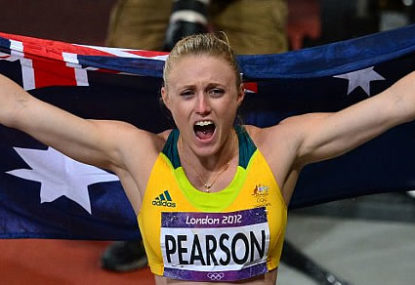Alan Moir, the brilliant cartoonist from The Sydney Morning Herald, once again nailed home his point in today’s newspaper.
Two Australian Special Services soldiers, armed to the teeth and with their guns cocked ready to blast away, have burst into the bedroom of a couple lying in bed reading a paper with the headline: Gold Tally.
The soldier with his gun pointing at the startled couple tells them: ‘We have reason to believe you’ve been barracking for New Zealand…’
As it happens, the day the cartoon was published was the day that Australia finally won more gold medals (four) at the London 2012 Olympics than New Zealand (three). If history is anything to go by, at the end of the London Games, Australia will have extended this now narrow lead by a substantial margin.
After all, Australia won 14 gold medals in Beijing. The most gold medals New Zealand has ever won was the eight at the 1984 Los Angeles Olympics.
New Zealand has a population of 4,327,944 people inhabiting the Shaky Islands. The outstanding fact about this is that about one million more New Zealanders live out of New Zealand. Like Scotland, New Zealand’s greatest export is talent of every kind, including sporting talent.
Moir himself, for instance, is part of a distinguished Dunedin sporting family.
So what does it say about the pysche of some Australian commentators that they got so worked up about the fact that little New Zealand had scored more gold medals than Australia?
Pathetic is perhaps the most kind word.
Loony is probably more accurate. We had Channel Nine, for instance, deliberately running the top nine countries on the medal tallies when New Zealand was in 10th place and Australia was 16th. And a desperate Daily Telegraph started to publish an Australia versus New Zealand medal tally.
This obsession that being behind New Zealand on the medals tally is somehow unacceptable, even though it was never going to be like this at the end of the tournament, shows a gross lack of maturity by the hype-merchants posing as commentators and by a number of the athletes.
The hysteria and lack of perspective of most of the commentators on Channel Nine (there are some honourable exceptions in equestrian and athletics) resulted in an unedifying chauvinism that demanded nothing less than gold from the athletes.
This madness was contagious and we had second place medalists behaving as if they had come last.
When all the behaviour is analysed, hopefully not by academics, but by former champions (Herb Elliot is a name that comes to mind) the accusation may well be made that Generation Y has too great an opinion of itself and not enough respect for other competitors and for the tradition of the Olympics.
Sorry to harp on, but I also blame so many uninformed commentators dragged in from the highways and byways (Michael Slater doing the diving, for instance) who gave out false propaganda about the performance of various athletes.
Many of these athletes were over-awed by the occasion and the sheer difficulty of competing at the Olympic level.
John Coates did not help things much with his prediction that Australia’s goal was to win 55 medals (on Wednesday the tally was 25) and that anything less would be seen as a failure. The only time Australia has won 55 or more medals was at Sydney when 58 were won.
49 medals were won at Athens in 2004 and 46 at Beijing in 2008 and 41 at Atlanta in 1996.
The Greeks have a word for the sort of boasting about gold, gold, gold for Australia from Coates, some of the preening athletes and the media. The word is hubris – arrogant pride.
Nowhere is this arrogant pride been more apparent than in the failed swimming team.
And nowhere has there been less hubris than in the sailing team. Tom Slingsby, for instance, came 22nd in his sailing discipline at Beijing. At London, four years later, he became Australia’s first individual gold medalist.
And after his triumph, he foreshadowed the possibility of three more gold medals for the Australian sailors.
‘I think we will be the top nation here,’ he told the media.
This turnaround from a poor Beijing Olympics for sailing followed an intensive review. An interesting article in The Australian Financial Review gave details of how this review found that sailing’s high performance unit failed in its task of implementing successful strategic initiatives.
A new coaching structure was set out, the Australian Institute of Sport was used more, 18 patrons were co-opted to provide more team finance, and competition with the world’s best, rather than Australia’s best, was made the standard practice.
When the London Games came around the sailing team knew exactly how they rated against their potential opponents, and how they could beat them.
Swimming is going to be subject to a review. Will it be as hard-headed and as unforgiving as the sailing review? Bill Sweetenham, an official from Swimming Australia is part of the review, an appointment that does not augur well for its prospects, in my opinion.
As it happens, the New Zealand sailing team, admittedly in a more modest way than their Australian counterparts, has helped the New Zealand medal tally slowly grow towards one of its most successful hauls.
Trying to make sense of the unpredictable elements has given the sailors a sense of perspective that many of their fellow athletes seem to have lacked this Olympics.





























































































